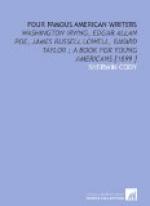He and his brother Peter, with a number of young men about the same age, called themselves “the nine worthies,” or the “lads of Kilkenny,” and many a gay time they had together,—rather too gay, some people thought. One of their favorite resorts was an old family mansion, which had descended from a deceased uncle to one of the nine lads. It was on the banks of the Passaic river, about a mile from Newark, New Jersey. It was full of antique furniture, and the walls were adorned with old family portraits. The place was in charge of an old man and his wife and a negro boy, who were the sole occupants, except when the nine would sally forth from New York and enliven its solitudes with their madcap pranks and orgies.
“’Who would have thought,” said Irving at the age of sixty-three to another of those nine lads, “that we should ever have lived to be two such respectable old gentlemen!”
About this time Irving and a friend named James K. Paulding proposed to start a paper, to be called “Salmagundi.” It was an imitation of Addison’s Spectator, and consisted of light, humorous essays, most of them making fun of the fads and fancies of New York life in those days. The numbers were published from a week to a month apart, and were continued for about a year.
The young men had no idea of making money by the venture, for they were then well-to-do; but to their surprise it proved a great success, and the publisher is said to have made ten or fifteen thousand dollars out of it. He afterwards paid the editors four hundred dollars each.
Irving now visited Philadelphia, Boston, and other places. He thought of trying for a government office, and was tempted into politics. His description of his experience is amusing enough.
“Before the third day was expired, I was as deep in mud and politics as ever a moderate gentleman would wish to be; and I drank beer with the multitude; and I talked handbill-fashion with the demagogues, and I shook hands with the mob—whom my heart abhorreth. ’Tis true, for the two first days I maintained my coolness and indifference.... But the third day—ah! then came the tug of war. My patriotism all at once blazed forth, and I determined to save my country! O, my friend, I have been in such holes and corners; such filthy nooks, sweep offices, and oyster cellars!”
He closes by saying that this saving one’s country is such a sickening business that he wants no more of it.
CHAPTER VI
“Diedrich knickerbocker”
On October 26, 1809, there appeared in the New York Evening Post the following paragraph:




